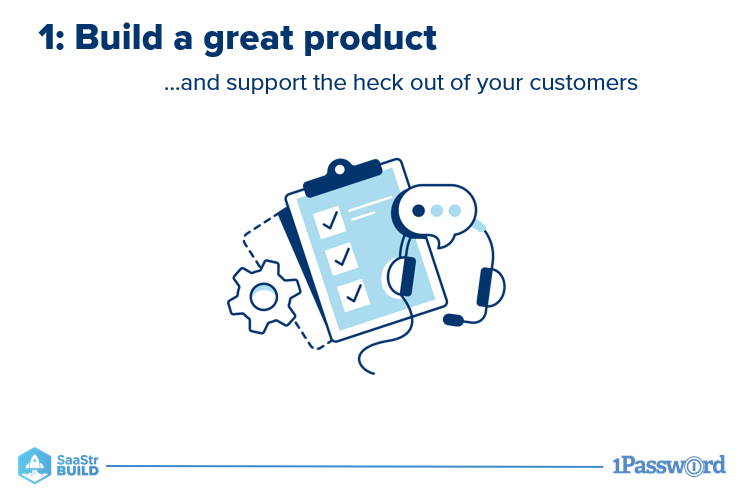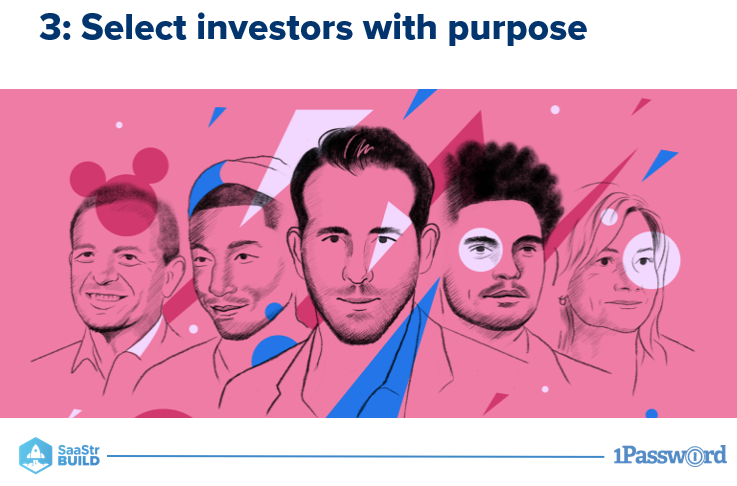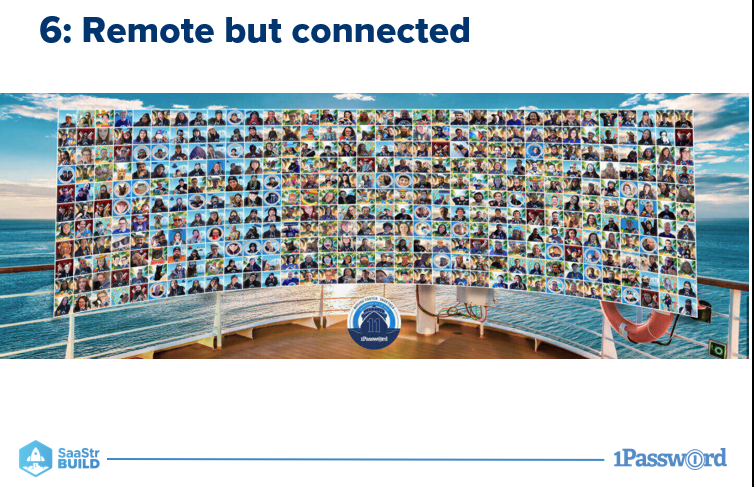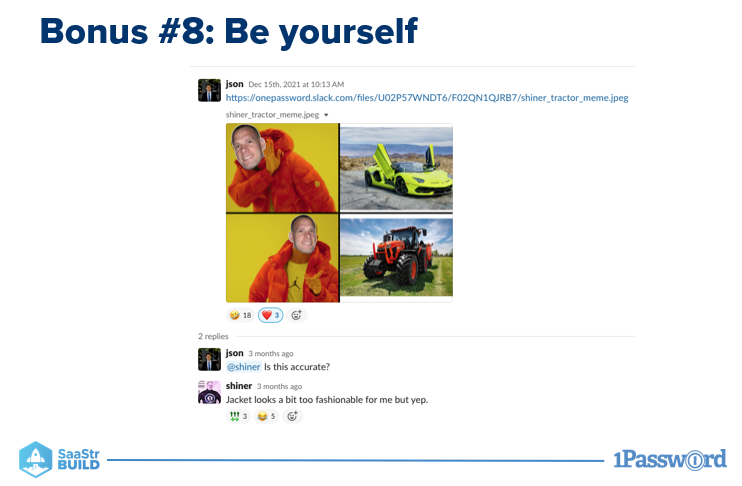Growing your company to $7 billion is not a quick process. It takes years, sometimes decades, of work for a company to hit the 10-digit mark. Along the way, there are key decisions and behaviors which drive the growth to multi-billion dollars.
Jeff Shiner, CEO of 1Password, is the leader in passwords and secret management. Jeff has led the growth of a remote, bootstrapped company over the past 16+ years of building 1Password. Pulling from the lessons he’s learned at 1Password, Jeff shares seven essential drivers to becoming a multi-billion dollar company.
Building a great product
If your product is so wonderful that people would buy it themselves, you don’t need to sell it to them. Supporting your customers is a crucial component of building a great product. You iterate and develop your products according to your customers’ needs, which first requires you to listen to them. With great product and customer support teams in place, you are ready to do this.
You can use product-led growth even in an enterprise model. For example, every employee of a 1Password customer gets a free family account with the enterprise model. When the family members of that employee use 1Password, they recommend 1Password to their workplaces and bring in more customers. This happens because when they use the product, they love it.
Building a great product and a customer support team to match its quality, both lead to the development of trust between your company and its customers. These customers become your brand ambassadors and drive your growth organically.

Profitability is power
Many companies are too focused on growing in size without first understanding if they have a viable business model. It can work, but it’s easy to lose focus on your mission and goals. You get too busy raising funds and reaching milestones that have been imposed upon you that may not align with your company’s long-term vision.
Profitability is an intentional choice. And while profitability will generally slow down the pace of your company’s growth, the growth will be more thoughtful and sustainable. You don’t have to compromise on your values to be profitable. Being profitable puts you in a position of strength and lets you focus on what your customers value.
Selecting investors with a purpose
“Have a clear purpose when you start looking for investors.”
1Password raised capital after running bootstrapped for a decade because they felt like they were leaving money on the table by not having a marketing and finance team. They eventually decided to approach investors in the process of raising funds.
Their initial goal was to build a relationship with a world-class investor who would help them tell their story to the world. This quickly resolved their brand visibility problem and they were soon able to attract more world-class talent to join them.
After growing their team, 1Password needed guidance from experts on how to navigate the next growth stages of the business. Eventually, they brought in celebrity investors who had the influence and reach to take the 1Password brand to a broader audience comprising their ideal customers.
This was only possible, though, because 1Password built a great product that their investors were users of.

From generalists to specialists
The fourth driver is to evolve your team from generalists to specialists. This is a painful process for many companies because you have to let go of the people who helped you build it along the way. For most companies, this step takes place at around 50-100 employees. While painful, this is a necessary step to ensuring you have the right people in place for the next stage of your company’s growth.
“There comes a point when companies need to shift from good-at-everything employees to great-at-one-thing employees.”
Generalists are the most valuable person in small companies. But as a company grows, the responsibility and expectations grow with it. The generalists are replaced by specialists across multiple teams in the company, often one by one.
To avoid significant turnover, Jeff recommends that companies prioritize the training and development of their existing employees early in the life of the company. Formalize the process of helping generalists to grow into specialist roles. 1Password saw success with this strategy when members of the customer support team started to transition into full-time developers.
Focus on B2B and B2C
Most companies are either B2B companies or B2C companies, but 1Password bridges the gap between the two successfully. The key to achieving this is to think about the end-users as people, not as consumers or businesses. Because the same people are using your product, just for a different purpose and in a different context.
“You can serve the person and ultimately the business they work for.”
Once you start to think of customers as humans, you are better able to provide real solutions that fit a real person’s life. This leads to working on human-centric solutions instead of segment-centric solutions.
When you target both B2B and B2C simultaneously, it is important to understand the revenue split and the interdependence of both on each other. Your primary target is to serve people and generate revenue.

Remote but connected
Though it didn’t plan to be a remote company, 1Password has been a fully remote company since its launch 16 years ago. This happened naturally when they opted to hire the best people for every role, no matter their location. As 1Password grew, they recognized this was a beneficial feature to their company and business model, so they continued with remote hiring and operating.
A remote work environment allows you to hire amazing people from a wider pool of talent, but it also poses the challenge of maintaining the connection among your teams. Hybrid work environments allow for more connection, but you still have to put extra effort into staying connected virtually. A few ways to prioritize connectivity:
- Organize AMA sessions with the leadership
- Bring casual conversations to a virtual environment via Slack channels
- Encourage the people working with you to reach out to you and be reachable yourself
Look after your people
“It’s the people working together who make a company, not just the leadership.”
As a small company, you can not compete with tech giants in terms of compensation alone. Looking after your people is a combination of three things which you can balance well to keep them happy.
- Culture: Culture doesn’t come from mottos and reminder emails, it comes from people. This includes both the leadership and those in lower- to mid-levels of the company. Keep this in mind as you hire and as you develop the people already working for you.
- Communication: Every member of the company should understand what you are trying to accomplish and why you are trying to accomplish it. Clarity and confidence in the work you are doing will raise the morale and performance of those on your team.
- Benefits and compensation: Benefits and compensation are a crucial part of taking care of your employees. To make sure you’re on the right track:
- Pay your employees a competitive salary
- Prioritize a mentally healthy workspace
- Allow for a few wellness days throughout the year when everyone takes a day off to recharge
Providing your people with good pay and benefits, a mission to buy into, and a secure environment to grow and learn will set your company up for success.

Key Takeaways
These 7 drivers to growing to multi-billion dollars are not industry secrets, but well-known best practices. The secret is to actually practice them consistently and diligently.
“Are you taking action on good advice or are you just talking about them?”
Take these action items and make them an active part of your journey to becoming a multi-billion dollar company.
- Build a great product and support your customers relentlessly.
- Profitability ensures you have the power and control in your hands.
- Select your investors with purpose.
- Develop your team of generalists to a team of specialists.
- Target B2B and B2C both by focusing on people.
- Put in efforts to preserve human connection in remote environments.
- Look after your people in multiple dimensions.

